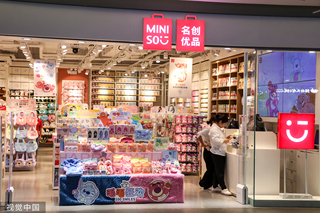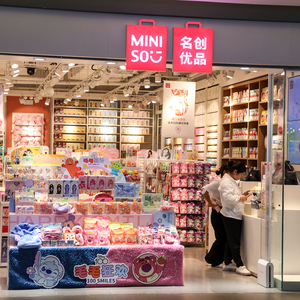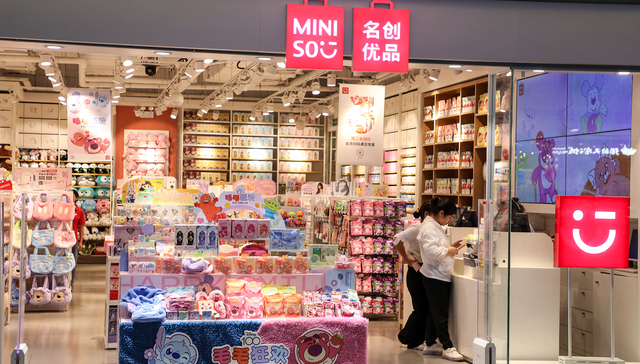By LU Yibei
Overseas revenue is growing at more than 40 percent annually for lifestyle retailer Miniso. Indonesia is home to one of its fastest-growing countries. The secret to the cute toy mart’s success? Basic stuff - product development, supply chain management, and conscientious people skills.
Driven by past regrets
When Miniso opened at Margo City, a shopping mall just outside Jakarta, in October, the locals were thrilled. Teenagers stood in line for hours to get a limited version of Kuromi, a doll with a naughty, slightly punky vibe, created by Sanrio, the company behind Hello Kitty.
Together, Miniso and Sanrio, already hugely popular in Indonesia, have turned the buzz about the retailer into a fervor. Margo City Miniso took close to US million (7.18 million yuan) in its first month.

Across the archipelago, Miniso now has over 230 stores. But memories of stagnant sales and dispiriting losses in Singapore – the first and for a while the only foreign market – linger, powering a remarkable transformation.
Since 2017, Miniso has been motivated by collaboration with intellectual IP owners worldwide, Sanrio being one of them. Now, with 2,300 stores in more than 100 countries, the international market contributes a third of Miniso’s revenue. Since 2021, overseas sales have grown by at least 40 percent each year, with gross margin now at 42 percent.
Everyone goes to the mall
A lot of emphasis is given to localization. Four innovation centers are planned – in China, the United States, Japan, and South Korea – to develop tailored designs for different markets.
For Indonesia, this is particularly critical. LI Zhongyang, head of Miniso Indonesia, has full authority over operations and expansion. All Miniso stores in Indonesia are in shopping malls. In a country with limited public space, urban dwellers go to malls at least twice a week to shop, socialize, and escape from the heat.
To make a big entrance, Li launched the first three stores simultaneously in the top three malls in February 2017. The concept of an emporium of cute, inexpensive knickknacks was new to local shoppers. The shelves emptied within days. Wholesalers journeyed from faraway places to buy popular products for resale. Within a year, Li had opened 100 stores, defying all predictions.
Sweet smell of local success
Perfume is Miniso’s biggest category in Indonesia, where people use scent much more frequently than their Chinese counterparts. Li sources most perfumes locally, except an expensive few.
Relying on suppliers that understand their domestic consumers can keep down costs. Nonetheless, about 80 percent of Miniso Indonesia’s products are made in China. The rest come from local factories or brands, either to lower costs or comply with tortuous local regulations.
Each of Miniso Indonesia’s 5,000 products is subject to local inspections. Instead of outsourcing compliance and customs matters, Li handles them in-house.
Before he joined Miniso, Li exported heavy machinery from China to Indonesia and spent many years working around the country’s bureaucracy. It used to take two months for a container of cosmetics to clear customs. Now, it’s done in two weeks.
Contained expansion
Shipping goods from Jakarta to Indonesia’s far-flung islands can be expensive and slow. Ports are few, roads are poor. Before the Jakarta-Bandung high-speed train started running in October, the entire railway system was stalled in the colonial era.
Sales vary widely among stores, which means plenty of trial and error in truck sharing and container-packing. This involves a mix of fancy data analytics and on-the-job experience.
“We have found ways to fit the goods for three containers into two,” Li said.
The results are impressive. Shipping sucks up only 1.4 percent of Miniso Indonesia’s revenue despite the obstacles.
Powerful people
Except for two dozen senior managers dispatched from China, Miniso’s 1,400 office and warehouse employees were hired locally. Cultural differences are real. Li observed that compared to their Chinese colleagues, Indonesian employees tend to be meticulous but slower.
High-performing employees attend an internal business school where both management skills and corporate culture are important components of the curriculum.
“In the beginning, a Chinese team did the training. The top graduates from those courses have now become the teachers,” Li said. Promising college graduates are recruited into trainee programs and rotate through various functions to prepare for key positions internationally.
Into the unknown
Miniso wants to open 1,000 stores in Indonesia. This means venturing out of shopping malls and into the crowded and unpredictable urban sprawl or the vast number of less-developed towns and villages outside big cities.
Street-level rents are cheap – in some places, it costs a tenth of the rent in shopping malls – but customer tastes are chaotic, with different tastes and budgets seemingly everywhere. This puts a lot of pressure on store managers. It’s easy enough to see what sells badly, but it’s harder to judge what might sell well.
Super-loved around the world
At the Margo City opening, CEO YE Guofu showed up, but not on stage. He watched the show quietly at a store nearby.
Internally, Ye and the team had talked a lot about how to become a globally loved super brand like Starbucks. And in a diverse country with only a third of China’s per capita GDP, there is a lot to learn.
Ye’s flight to Jakarta was packed with business people as keen as him to stake out new markets on the islands. Opportunities are vast. So are the complexities.





